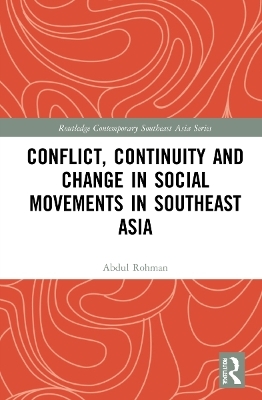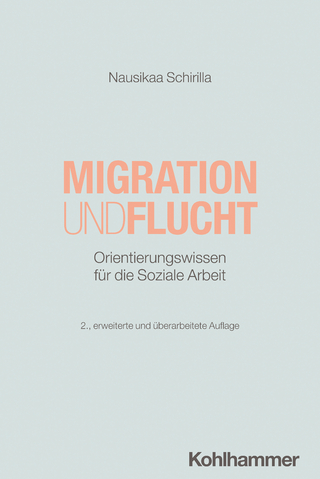
Conflict, Continuity, and Change in Social Movements in Southeast Asia
Seiten
2024
Routledge (Verlag)
978-1-032-20469-7 (ISBN)
Routledge (Verlag)
978-1-032-20469-7 (ISBN)
This book demonstrates how preserving ideology and relationship with other activists affords social movements to persist over time amid limited resources and political opportunities in Southeast Asia.
This book demonstrates how preserving ideology and relationships with other activists affords social movements to persist over time amid limited resources and political opportunities in Southeast Asia.
Examining two peace movements in Indonesia – the largest democratic country in Southeast Asia – to illuminate discontinuity, continuity, and change in social movements, the author uses a cultural approach to understanding why social movements persist. He argues that the activists’ memory, relationship with others, collective identity, and emotion are reasons for social movements to ascend and peak. This is a direct response to the argument that the availability of resources and political opportunities is the main ingredient for any social movements to rise. While having different fates, the two movements studied arose in the midst of violence between Christian and Muslim communities in Ambon, Indonesia: The Kopi Badati movement and Filterinfo. The book extends the applicability of the cultural approach in explaining why social movements discontinue, continue, and change over time, without discounting the importance of available resources and political opportunities.
Addressing a gap in the existing social movement studies, the book explains why a social movement disbands and why the other manages to continue and change after achieving its immediate goal. It will be of interest to academics in the fields of Asian studies, (new)-media and communications, civil society, and international development.
This book demonstrates how preserving ideology and relationships with other activists affords social movements to persist over time amid limited resources and political opportunities in Southeast Asia.
Examining two peace movements in Indonesia – the largest democratic country in Southeast Asia – to illuminate discontinuity, continuity, and change in social movements, the author uses a cultural approach to understanding why social movements persist. He argues that the activists’ memory, relationship with others, collective identity, and emotion are reasons for social movements to ascend and peak. This is a direct response to the argument that the availability of resources and political opportunities is the main ingredient for any social movements to rise. While having different fates, the two movements studied arose in the midst of violence between Christian and Muslim communities in Ambon, Indonesia: The Kopi Badati movement and Filterinfo. The book extends the applicability of the cultural approach in explaining why social movements discontinue, continue, and change over time, without discounting the importance of available resources and political opportunities.
Addressing a gap in the existing social movement studies, the book explains why a social movement disbands and why the other manages to continue and change after achieving its immediate goal. It will be of interest to academics in the fields of Asian studies, (new)-media and communications, civil society, and international development.
Abdul Rohman is a lecturer and researcher in the School of Communication and Design at RMIT University, Vietnam. He is interested in understanding socio-technical and cultural changes in Southeast Asia.
Chapter 1 Introduction
Chapter 2 The life of social movements
Chapter 3 Ambon in episodes of violence and peace
Chapter 4 Badati what lead a movement to discontinue
Chapter 5 The rise of Filterinfo
Chapter 6 The peak of Filterinfo
Chapter 7 The ebb and dormancy of Filterinfo
Chapter 8 The rise of new community groups
Chapter 9 Filterinfo as repository and memory
Chapter 10 Friction, competition, and reconciliation
Chapter 11 Social movements in post-conflict Ambon
Chapter 12 Conclusion
| Erscheinungsdatum | 03.05.2022 |
|---|---|
| Reihe/Serie | Routledge Contemporary Southeast Asia Series |
| Zusatzinfo | 1 Tables, black and white |
| Verlagsort | London |
| Sprache | englisch |
| Maße | 156 x 234 mm |
| Gewicht | 308 g |
| Themenwelt | Sozialwissenschaften ► Ethnologie |
| Sozialwissenschaften ► Pädagogik ► Sozialpädagogik | |
| Sozialwissenschaften ► Politik / Verwaltung ► Staat / Verwaltung | |
| Sozialwissenschaften ► Soziologie ► Spezielle Soziologien | |
| ISBN-10 | 1-032-20469-9 / 1032204699 |
| ISBN-13 | 978-1-032-20469-7 / 9781032204697 |
| Zustand | Neuware |
| Haben Sie eine Frage zum Produkt? |
Mehr entdecken
aus dem Bereich
aus dem Bereich
Grundlagen - Konzepte - Methoden
Buch | Softcover (2023)
Kohlhammer (Verlag)
CHF 47,60
ein Lehrbuch zum Kita-Management
Buch | Softcover (2023)
Kohlhammer (Verlag)
CHF 64,40
Orientierungswissen für die Soziale Arbeit
Buch | Softcover (2024)
Kohlhammer (Verlag)
CHF 49,95


